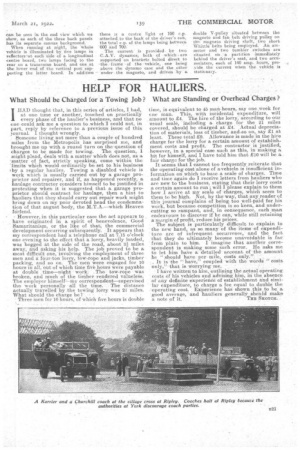HELP FOR HAULIERS.
Page 21

If you've noticed an error in this article please click here to report it so we can fix it.
What Should be Charged for a Towing Job ? What are Standing or Overhead Charges ?
IHAD thought that, in this series of articles, I had, at one time or another, -touched on .practically every phase-of the haulier's business; -anel that no one could ask me a question to Which I could not, in part, reply by reference to a previous issue of this
journal I thought wrongly. . .. someone living not more than a couple of hundred miles from the Metropolis has surprised me, and brought me up with a round turn on the-question of charges to be made for towing. The question, I might plead, deals with a matter which does not, as a 'matter of fact, strictly speaking, come within the
'limits which would ordinarily be set to his business 1 by a regular haulier. Towing a disabled vehicle is
work which is usually carried out by a garage pro prietor and repairer, and if, as happened recently, a haulage contractor considers himself to be justified in protesting when it is suggested that a garage pro prietor should contract for haulage, then a hint to hauliers that they shonld carry out repair work might bring down on my poor devoted head the condemnation of that august body, the M.T.A.—which Heaven fdrf end.
However, in this particular case the act appears to ,
have originated in a spirit of benevolence, Good Samaritanism, or the like of that5 the commercial development Occurring subsequently. It appears that my correspondent had a telephone call at 7.15 o'clock one evening to the effect that a lorry, heavily loaded,
was bogged. at the side of the road, about 31 miles
away, and asking his help. The job proved to be a most di:Melia pne, involving the employment of three men and a four-ton lorry, tow-rope and jacks, timber packing, and so on. The 'men were engaged for 10 hours in all, out of which tithe five hours were payable at double time—night -work.. The tow-rope was
broken, and much of the timber rendered valueleas. The employer himself—My correspondent—supervised the work personally 'all the time. The distance actuallY travelled by the towing lorry was 21 miles. What should the charge be . . .. . Three men for 10 hours, of which five hours is double
time, is equivalent to 43 man-hours, say one week for one man. This with incidental expenditure, will . amount to 24. The hire of the lorry.; according to our usual Seale, including a, charge for the 21 miles covered, should be charged at 24: 'Actual depreciation of materials, loss of timber, andel) on, say 21 at least. These total £9. Allowance is made in the hire charge for the lorry for a certain amount of establishment costs and profit. The contractor is justified, however, in a special case such as this, in making a bit for himself, and I have told him that 210 will be a fair charge for the job. It seems that I cannot too frequently. reiterate that the operating cost alone of a vehicle is Insufficient information on which to base a scale of charges. Time and time again do I receive letters from hauliers who are new to the business, stating that their lorry costs a certain amount to run ; will I please explain to them how I arrive at my scale of charges, which seem to them to be high. Not, by the way, that any reader of this journal complains of being too well-paid for his work, but because competition is so keen, and undercutting so rampant, and, in consequence, each man endeavours to discover if he can, while still retaining a noo gin of profit, reduce his prices. The subject is particularly difficult to explain to the new hand, as so many of the items of expenditure are of infrequent, occurrence, and the fact that they do ultimately become unavoidable is far. from plain to him. I imagine that another correspondent is making some such error. He asks me to let him have a, detailedaccount of the amount he "should have per mile, Costs only.",.
It is the "have," coupled with the words " costs.
only," that is' Worryingme. • I have written to him, outlining the actual operating costs Of his vehicles and advising him, in the absence of any definite experieriee of establishment and similar expenditure, to charge a fee equal to double the -operating cost. Experience has shown this to be a good average, and hauliers generally should make a note of it. THE SKOTCH.


































